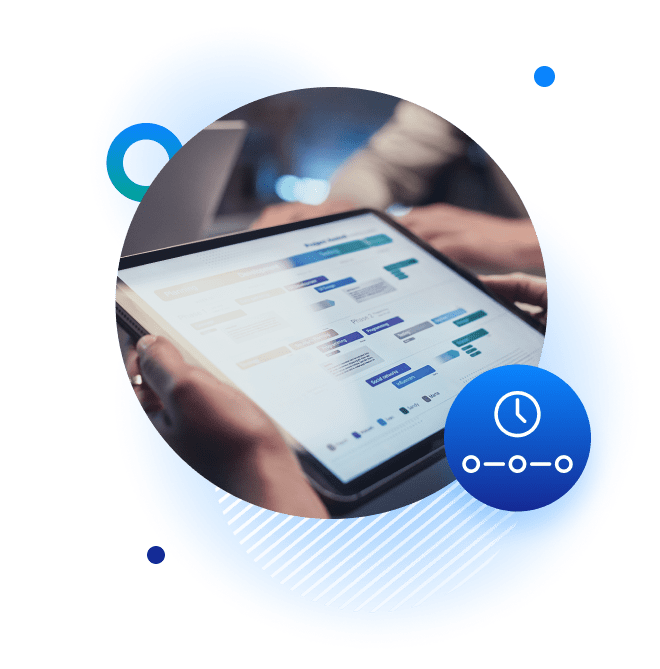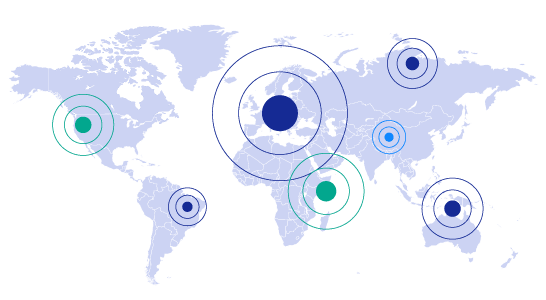Secure Full Compliance with French e-Invoicing Mandates
Master e-invoicing in France with our certified, end-to-end solution. Comarch integrates with your existing systems to guarantee full compliance.
Secure Full Compliance with French e-Invoicing Mandates
Master e-invoicing in France with our certified, end-to-end solution. Comarch integrates with your existing systems to guarantee full compliance.

France is launching a major reform to modernize its invoicing system. This mandate will replace traditional paper and PDF invoices with a mandatory digital process for all companies subject to French VAT.
The primary goals of the French government (DGFIP) are to:
This reform introduces new obligations for e-invoicing and e-reporting, which function under a specific new transmission model.

This is the obligation to issue and receive structured electronic invoices for all domestic B2B transactions.

This is the obligation to digitally report data from transactions that are not covered by e-invoicing.

This is the mandatory data transmission framework. Companies can no longer send invoices directly to each other. All e-invoices and e-reports must be exchanged through a certified platform.

 2024
2024Proposal of the Plateforme Agréée (Certified Platform) licensing process.
 2026
2026September 1, 2026*:
 2027
2027September 1, 2027*:
*The French government has noted that the September deadlines for both 2026 and 2027 may be postponed by one quarter, to December of their respective years.
For B2C and international transactions, the process is not an invoice exchange but a periodic data report to the authorities.
Comarch SA and Comarch SAS France are officially "registered under reserve" by the French tax authority. This official status confirms Comarch is a trusted candidate, validated by the government to be in the final testing phase and fully prepared to operate as a certified platform for the 2026 mandate.

While the public portal (PPF) is a free option, it only provides the most basic functionalities. A registered platform like Comarch is a strategic partner that manages compliance for you.
Our end-to-end solution handles the full scope of your business needs:

As a registered partner, our solution is continuously updated to ensure you are always compliant with DGFIP requirements. For multinational companies, our platform is a global compliance hub, managing e-invoicing and tax regulations in over 60 countries from a single interface.
Our solution is ERP-agnostic. We connect directly to your existing systems (SAP, Oracle, etc.), minimizing the burden on your IT teams. Comarch handles all complex data mapping and format conversions (Factur-X, UBL, or CII) so you don't have to redevelop your core applications.
Our platform automates your entire Order-to-Cash and Purchase-to-Pay workflows, not just the invoice submission. This reduces manual errors, accelerates processing, and improves cash flow by getting invoices approved and paid faster.
As a European company, we prioritize your data's security. Your sensitive financial data is processed in Comarch's own secure, certified data centers in Europe, we are not reliant on third-party hyperscalers. This ensures maximum data sovereignty and full adherence to strict ISO 27001 and TISAX standards.
The mandate is being phased in. While B2G e-invoicing (via Chorus Pro) is already mandatory, the B2B mandate begins on September 1, 2026.
PPF (Portail Public de Facturation) is the free, public portal that expands on the existing Chorus Pro B2G platform. It handles the basic, mandatory exchange of e-invoices and e-reports.
Plateforme Agréée (Certified Platform) is an officially registered private platform, like Comarch. A Plateforme Agréée (Certified Platform) acts as a strategic partner, offering essential value-added services the PPF does not, such as direct ERP integration, automatic format conversion, data validation, and full workflow automation.
The mandate requires all B2B e-invoices to be in a structured format. The three accepted standards are Factur-X (a hybrid format), UBL, and CII. A simple PDF will no longer be compliant.
All e-invoices must be stored in a secure and compliant electronic archive for a minimum of 10 years, guaranteeing their integrity and authenticity for the entire period.
Your provider must be officially registered as a Plateforme Agréée (Certified Platform) candidate by the DGFIP, as this confirms they are a trusted, state-vetted partner. You should also look for a provider with deep global experience in e-invoicing, proven integration capabilities with your ERP system, and a commitment to data security.

Make sure your business meets international standards with the Comarch e-Invoicing platform, trusted in more than 60 countries. Enjoy hassle-free integration and continuous compliance updates.